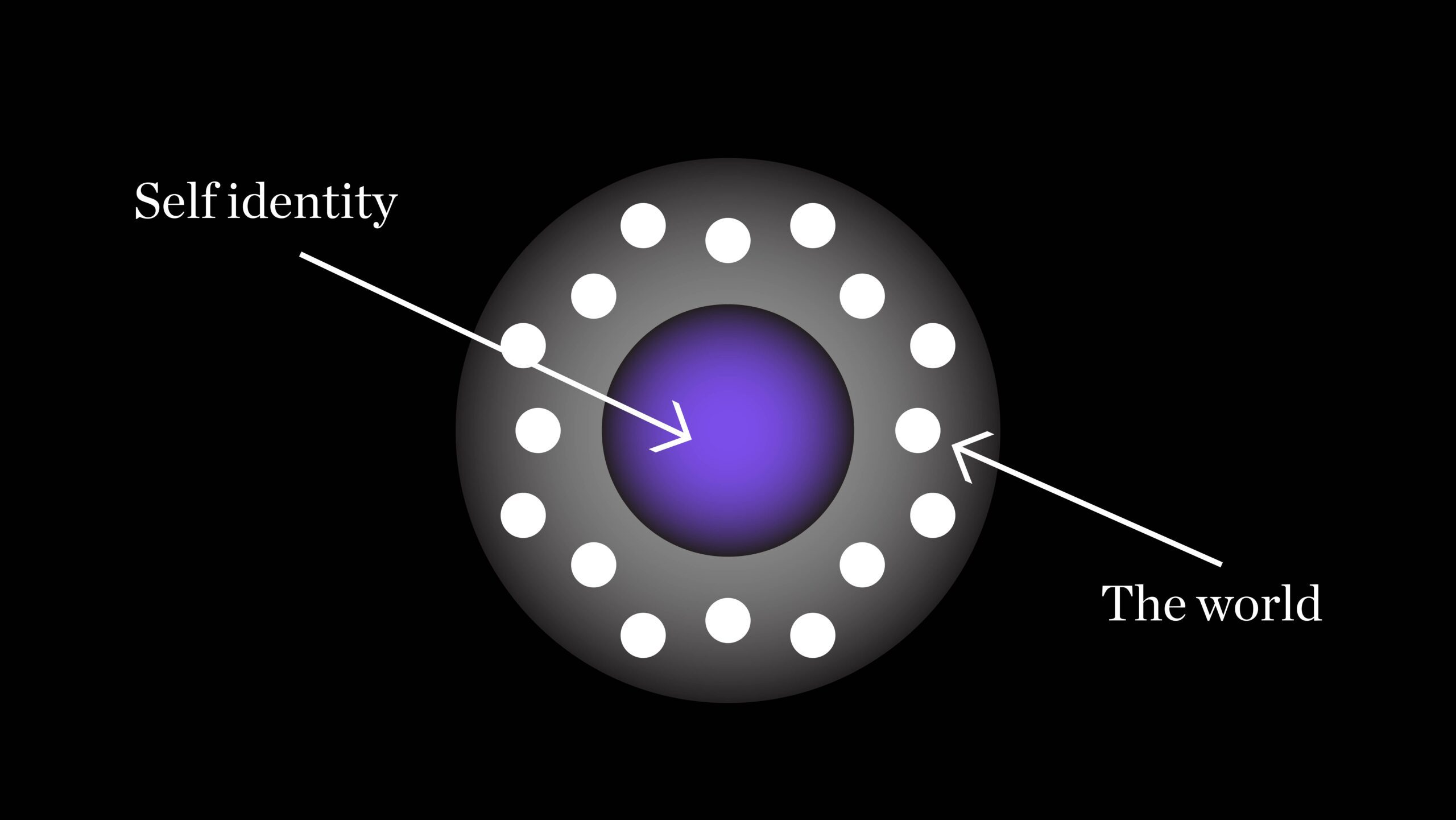Article last updated on January 26, 2023
The importance of self identity can not be overstated. It is the foundation of our sense of self and how we view ourselves in relation to others.
Self identity is a crucial part of mental health, as it helps us to understand who we are and how we fit into the world around us.
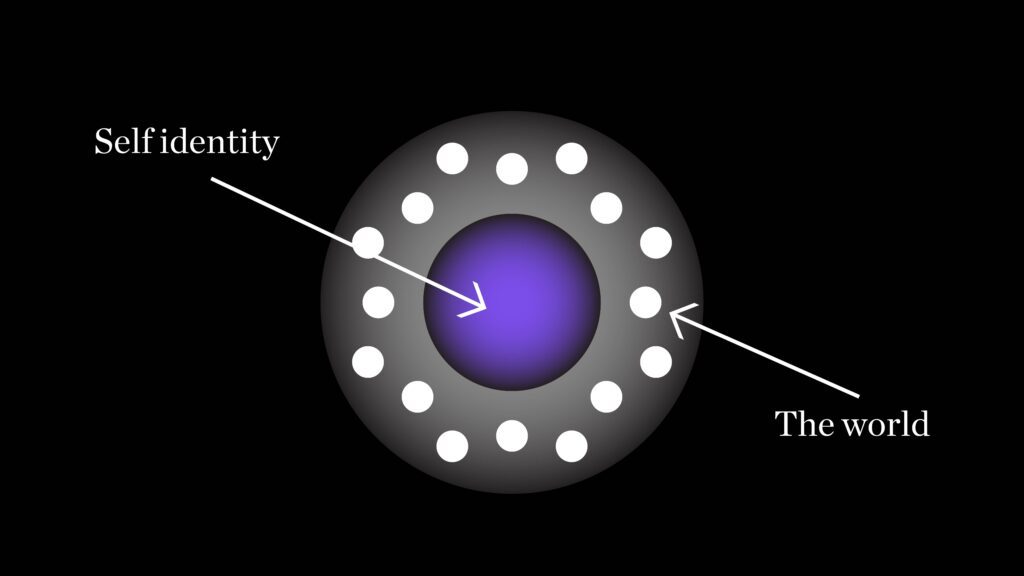
Throughout this article, I will be exploring why developing a strong sense of identity is so essential to long-term mental health — and what we can do to promote positive personal growth.
Our sense of self-identity shapes every aspect of our lives, from influencing the way we think to determining our behavior in social situations.
It even affects how open or closed we are when faced with new experiences.
When we lack confidence in ourselves, it can lead to feelings of
- depression
- isolation
- anxiety
On the other hand, having a secure understanding of who you are makes us more resilient against life’s struggles and setbacks.
Exploring your true identity takes courage, but it also comes with immense potential reward.
We need to learn that there is no “perfect” version of ourselves out there waiting for us; instead, discovering who you are involves learning about yourself through trial and error, facing uncomfortable truths head on, and ultimately embracing everything that makes you uniquely special!
In essence, striving for self-discovery means taking control over your own narrative, something everyone should strive for if they want to achieve lasting happiness and satisfaction in their lives!
What Is Self-Identity and Why Does It Matter
Understanding your self-identity is like climbing a mountain: you can see the peak, but it takes time to make it there.
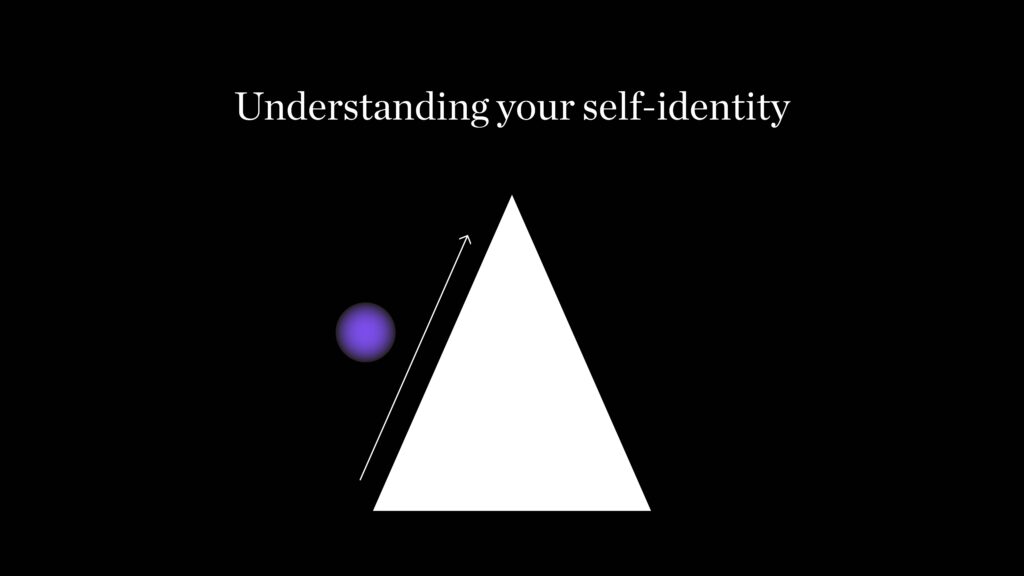
Self-identity is an internal awareness of who we are and how that identity fits into our social environment.
It’s critical for mental health because when one has a sense of identity, they have a better understanding of their goals and values in life.
Identity development begins with exploring all aspects of oneself, such as beliefs, thoughts, feelings, and behaviors.
By doing this work internally, individuals can gain confidence in themselves, which helps them build relationships with others externally.
This process gives people the ability to be comfortable in their own skin without worrying about what other people think or say about them.
When someone knows exactly who they are and what matters most to them, they become empowered by owning their story and living it out loud.
They also begin to trust themselves more deeply, so that decisions come from within instead of relying on external sources for validation or direction.
Also, having a strong sense of who we are makes us more creative, which gives us access to new ideas and points of view that could help us personally and professionally.
Having an intimate knowledge of yourself provides clarity on personal boundaries while strengthening communication skills —all important tools needed when managing difficult conversations or situations effectively.
This also makes people more open to change, since they know themselves well enough to know where they need to grow instead of staying stuck in old habits or patterns that aren’t helping them.
A healthy sense of self-identity leads to improved emotional regulation since being able to identify emotions accurately helps manage stress levels better over time.
When combined with effective coping strategies such as mindfulness practices or journaling, individuals can learn how to respond rather than reacting impulsively based on past experiences or fears.
Having control over your emotions keeps you mentally and physically stable, which improves your overall health as you go through life.
How Does Self-Identity Impact Mental Health

The impact of self-identity on our mental health is something that can be felt like a punch in the gut. It’s an invisible force, yet its effects are real and powerful.
We all have an internal identity story about who we are; it’s almost like a script for how we act in different situations.
This narrative identity is based on external self-awareness, personal identity, and choice meaningfulness scores.
Our life experiences shape this narrative; memorable life events become part of our identity, which then influences our emotions and behavior.
When considering the importance of self-identity, it’s crucial to remember that this isn’t just a memory exercise or checklist – it’s much more than that!
Self-identity has the power to influence everything from your mood to your relationships with others.
It shapes our thoughts, feelings, and decisions at every turn.
For example, if you identify strongly as someone who values their independence, you may make choices differently than someone who identifies as someone who puts family first.
Understanding where these identities come from helps us understand why certain things affect us the way they do, both positively and negatively.
Self-identity is an essential element of human nature because it allows us to create meaning out of our lives through the stories we tell ourselves about who we are and what matters most to us.
When people feel connected to themselves and their own sense of purpose in life, they experience greater levels of overall well-being.
On the other hand, people can have trouble finding a sense of belonging or purpose in their lives if they don’t understand or are clear about who they are.
This can lead to problems like low self-esteem, which can have negative effects on mental health over time.
Innovative approaches such as Narrative Therapy seek to help individuals explore their past experiences and beliefs in order to gain insight into how those elements shape one’s current view of oneself, ultimately allowing them to take control over changes they want (or need) to make in order to better align with goals they find meaningful or valuable in life today– fostering positive shifts in mental health outcomes along the way.
This exploration helps people grow by helping them see patterns in their thought processes that could lead to different ways to move forward, instead of just relying on habitual responses based on past experiences or expectations that may no longer serve them.
This lets people take back control of their stories and work toward a balance between their own wants and values and pressures from the outside world.
Taking steps towards gaining deeper insights into yourself offers countless opportunities for transformation; whether big or small, each step taken leads closer to being able to not only acknowledge but also accept one’s true essence – unlocking hidden reserves of energy necessary for nourishing all aspects of physical, emotional, spiritual, and psychological wellbeing.
As we transition into exploring “self-identify and self-esteem,” let’s keep this idea top of mind: embracing individual uniqueness encourages healthy expression, making possible the highest form of harmony amongst body, mind, and spirit.
Self-identity and self-esteem
Our identity is like a jigsaw puzzle, with pieces scattered all over the place.
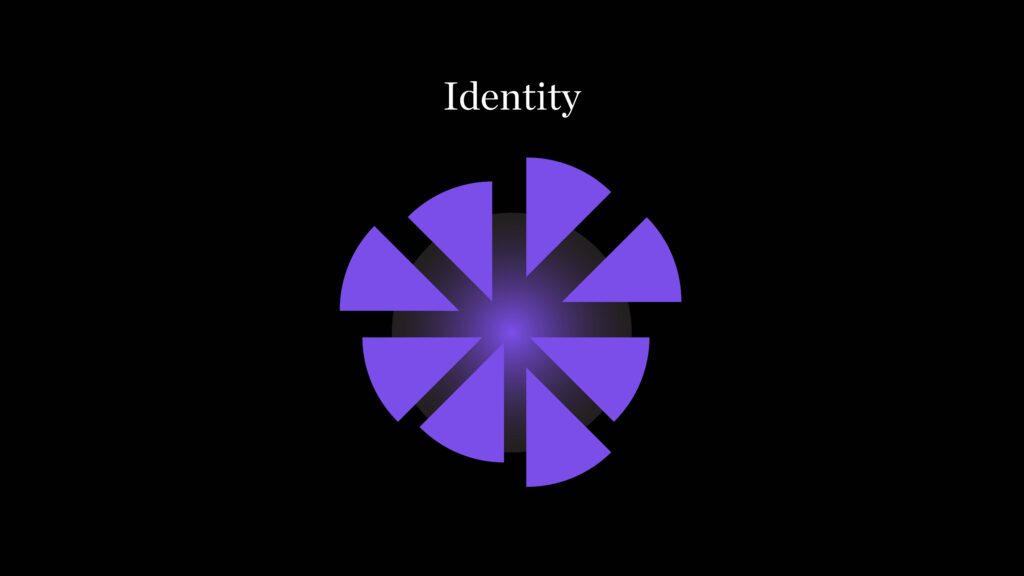
It’s not easy to make sense of it all or understand how self-identity and mental health are connected. In this section, we’ll explore the impact that our identities have on our self-esteem, which in turn can influence our emotional wellbeing.
A person’s identity crisis may arise from external factors such as familial relationships, social circles, or cultural values.
This can be daunting to think about, but it’s important to remember that each individual has their own unique reasoning when it comes to forming an identity.
We all respond differently to different aspects of identity; age, gender, race, and sexual orientation might factor more into one person’s life than another’s.
What’s equally important, though, is understanding where these individual differences come from – namely ourselves!
Our beliefs shape who we are and form the basis for our decisions and behaviors; they become part of us in much the same way that physical qualities do.
So when we look at ourselves objectively and honestly accept both positive traits and flaws alike, then we’re closer to finding balance within ourselves.
This kind of introspection helps us get a better handle on issues related to self-identity and allows us to work through any issues blocking personal growth.
Taking ownership of your emotions will give you a greater ability to cope with difficulties and find solutions that fit your needs rather than those imposed by others around you.
This process involves accepting yourself and knowing what makes you feel good (or bad) so that you can take steps towards improving your mental state without compromising your core values.
In order for someone to thrive mentally, having strong feelings of self-worth is essential, yet this isn’t something innate; it must be cultivated throughout life in order for true confidence to blossom within us.
To learn more about developing an authentic sense of self while maintaining healthy connections with other people around us, let’s move onto discussing “self-identity and self-awareness.”
Self-identity and self-awareness

It’s said that “knowledge is power,” and when it comes to self-identity and self-awareness, this couldn’t be more true.
With the right amount of knowledge about ourselves, we are able to make decisions with greater confidence in a variety of contexts.
By understanding our explicit reasoning behind choices as well as our perceptions of the meaningfulness of those choices, we are better equipped for self-reflection, which can improve our mental health condition.
When discussing factors influencing self-identity and self awareness, research has demonstrated that manipulation of participants’ decision-making contexts had an effect on their behaviors.
This implies that by being aware of how external stimuli impact us, we can gain insight into why certain behavior patterns arise when faced with certain situations or environments.
As such, people who have higher levels of awareness tend to possess the ability to regulate themselves better when presented with challenging circumstances, which leads to increased feelings of control over one’s life – something essential for healthy mental wellbeing.
Moreover, having awareness also allows us to understand not just what motivates us but also why other people may act differently from us.
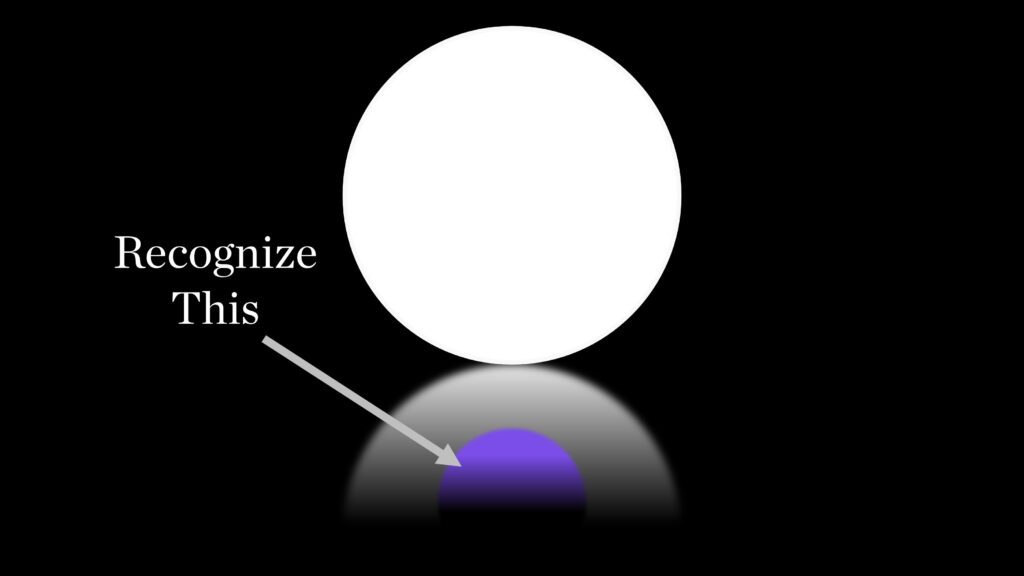
In turn, this helps build empathy towards others since recognition of different perspectives enables us to appreciate variations among individuals, leading to an acceptance of diversity – something critical for feeling safe within oneself and cultivating a sense of belonging in society at large.
Ultimately, without a good degree of self-reflection enabled by internalized understanding gained via personal exploration and external input, it is impossible to develop resilience in times of difficulty or anticipate potential risks during moments where difficult decisions must be made swiftly.
So let’s remember that gaining knowledge about ourselves isn’t merely an exercise in vanity; rather, it is a key part of contributing towards overall emotional wellbeing, because only once you come to truly know yourself will you begin to fully live your best life. And so, transitioning into the next section…
Factors Influencing Self-Identity
Statistics show that the sense of self-identity has a strong influence on mental health.
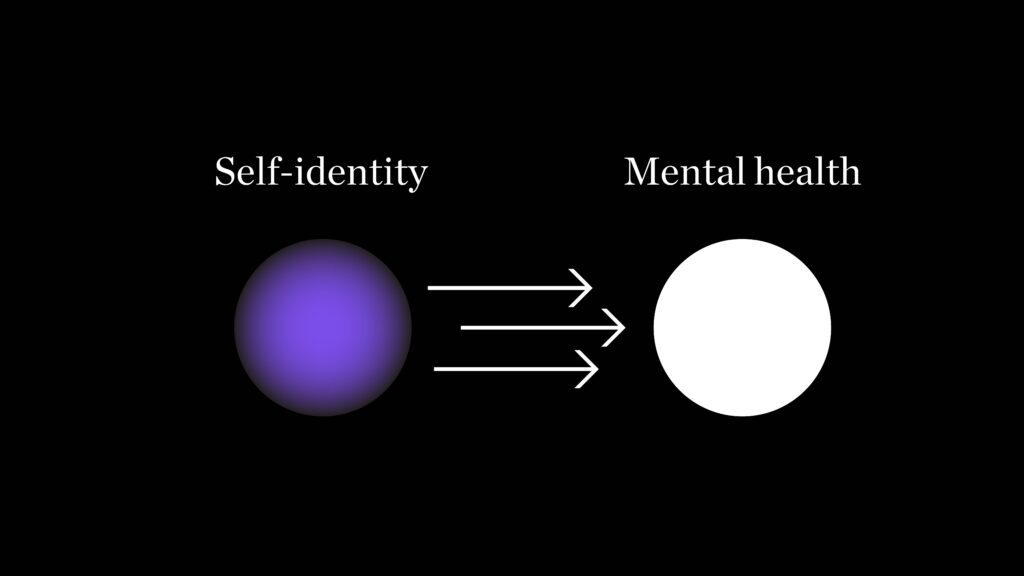
In other words, understanding and accepting who we are is essential to maintaining positive mental wellbeing. To better understand this concept, let’s take a look at some of the factors influencing self-identity.
Firstly, experimental paradigms such as allocation choices in control and self-reflection conditions can have an effect on our identity.
For example, if you choose to make certain decisions over others under particular circumstances or contexts, then it could shape your perception of yourself.
Furthermore, cultural level influences come into play when looking at how socialization affects feelings about one’s own identity.
It is believed that early childhood experiences with family and peers help form an individual’s view of their characteristics and personality traits.
At the same time, individual behavior also plays an important role.
On top of that, making conscious changes towards creating healthier habits, such as eating nutritious meals or exercising regularly, can lead to improved physical and emotional well-being, which will consequently strengthen self-identity formation processes.
Finally, it should be noted that people often struggle internally with issues related to self-acceptance due to external pressures from society or even themselves.
This makes it even more important for people to actively work on building a healthy sense of self by doing the things listed above. This will help them deal with their emotions in stressful situations and keep their mental health in good shape.
Moving forward onto the next section – exploring how social media impacts our self-identity – we’ll find out just how much technology has been affecting us psychologically.
Self-identity and social media
Finding your identity is like a puzzle. Every piece needs to fit together perfectly if you want the finished product to look just right.
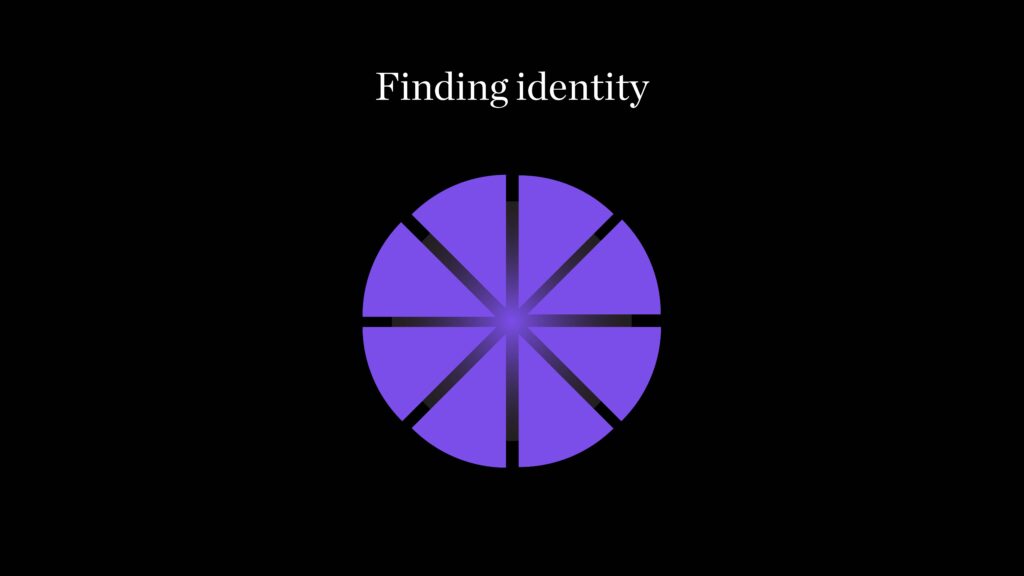
Social media can be a helpful tool in that process, but it’s important to remember that what we post and share online doesn’t necessarily reflect our true selves.
The seemingly insignificant decisions we make on social media every day, such as which filter to use or what caption to add, may appear insignificant, but they can have an impact on how others perceive us.
It’s easy for people to misinterpret our posts and form opinions about who we are without ever getting to know the real us.
This means that when it comes to forming self-identity, social media plays a role in shaping our image, even though its influence might not always be accurate.

When reasoning preconditions impact our behavior on social media, it can lead to further explanations for why we act a certain way online.
For example, someone might try extra hard with their appearance because of low self-esteem or favoritism factors; similarly, one might put more effort into curating content because of their fear of being judged by peers or family members.
The level of meaning behind these actions varies from person to person, but understanding why we do them helps us see ourselves more clearly and shows us how we define ourselves outside of the digital world.
Social media gives us countless opportunities every day – choices between authenticity and approval, truth and facade – so it’s up to us how much value we give those decisions and how they shape who we become over time.
Letting go of any preconceived notions is key here; instead, take yourself out of situations where you think you need validation and start exploring all the ways you can express your individuality without relying on external sources.
This exploration will help create a healthier sense of self-identity – something rooted deep within oneself rather than derived from other people’s perspectives – allowing you to feel comfortable in your own skin regardless of what anyone else thinks or says about you online or off.
Developing a Healthy Sense of Self-Identity
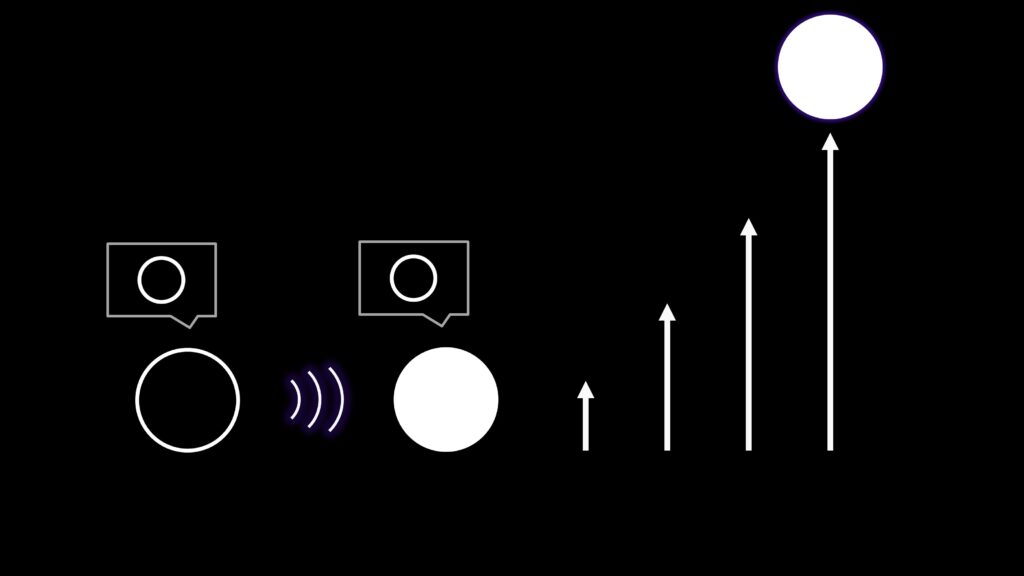
In today’s world, with the rise of social media and its effects on identity formation, it can be difficult to figure out how to cultivate a strong self-image.
We must, however, strive to understand what makes us unique and to create an identity that allows us to discover our true selves—one that will have positive effects between conditions, meaningfulness across conditions, future persons, adolescent behavior, and effect difference.
The first step towards developing a healthy sense of self-identity is understanding yourself.
We all have different strengths and weaknesses; take time to recognize them and acknowledge their importance in your life.
Once you know who you are at your core, you’ll be better equipped to make decisions about where you want to go from here.
It may also help to find someone or something outside of yourself that helps define who you are; this could be a hobby or passion project that brings you joy or a place of comfort that grounds you when things get tough.
Creating boundaries within ourselves is another important element for building strong identities.
Knowing what values matter most to us enables us to identify what behaviors are acceptable and unacceptable without relying too heavily on external validation from others.
This will allow us to feel more secure in our own skin while still remaining open-minded enough to accept new ideas and experiences into our lives as they come along.
Finally, learning how to express ourselves authentically goes hand in hand with strengthening our identity.
Having confidence in our thoughts, feelings, beliefs, and opinions gives us the power to not only stand up for ourselves but also inspire those around us by showing the world just how amazing we truly are!
So let’s start taking steps towards embracing every part of who we are so that we can live fuller lives filled with meaningfulness across conditions, future people, adolescent behavior, and differences in effects.
Frequently Asked Questions
After exploring the above information, you may still have lingering inquiries. In an effort to address a wide array of questions, here are some common ones about self identity.
What strategies can I use to develop a healthy sense of self-identity?
Firstly, having authentic conversations with yourself is key – not only tuning into your feelings and thoughts but also taking note of what makes you unique from those around you.
By doing this on a regular basis, you’ll start to develop a greater understanding of who YOU really are and what values shape your beliefs.
Another way to create a healthier sense of self-identity is by challenging limiting beliefs or negative dialogue, which often arise out of comparison with others or fear of judgment or failure.
If these scenarios arise, take time to pause and ask yourself if they’re true – more often than not, they aren’t!
You could even try writing down all the things that make you special (kindness, intelligence etc.) so that when these doubts come up again, you have something tangible to remind yourself just how fantastic you are in your own right.
Finally, one thing I think everyone should strive for is cultivating their own personal growth through learning new skills or pushing themselves out of their comfort zone every once in awhile.
This helps break patterns that no longer serve us while developing self-confidence in areas where we may feel vulnerable or unsure.
Plus, it gives us something else to focus on when life gets overwhelming, helping us reclaim control over defining ourselves instead of letting external factors dictate who we become.
So whether it’s building upon existing strengths or exploring uncharted territories, simply put, don’t be afraid to invest in getting to know yourself better!
Self-discovery can be hard at times, but if you give it a chance, it will lead to rewards that will make your life better than you could have imagined.
How do I know if my self-identity is healthy or unhealthy?
Self-identity focuses on who you are as an individual—your values, beliefs, goals, and ambitions—while self-esteem is about recognizing your worth and value as a person.
Now that I’ve established what makes up my personal identity and why it’s important for me to have a strong sense of it, the next step was determining whether my current level of confidence in myself was healthy or not.
To gauge this accurately, it required some honest introspection – looking at how I feel when asked questions like “Who am I?” or “What matters most to me?”
Taking stock of my responses helped paint a clearer picture; did I respond with clarity and conviction, or hesitation and doubt? Am I able to articulate my unique strengths without hesitating or with pride? If so, then chances are good that my identity is in a generally healthy state.
On the other hand, feelings such as low self-worth or uncertainty could signal an area needing more focus.
So what now? Once I had determined which areas needed work (if any), creating an action plan became paramount in order to achieve balance when it came to my identity and mental wellbeing.
This could involve anything from learning new skills to participating in activities that bring joy to simply allowing myself moments for restorative reflection.
Taking baby steps allowed me to make tangible progress over time until eventually I found equilibrium – something that has been incredibly beneficial for maintaining peace of mind throughout all stages of life.
What are the potential risks of having a weak sense of self-identity?
Having a weak sense of self-identity can have a number of potential risks.
People with a weak sense of self-identity may struggle to make decisions, as they lack the confidence and clarity to do so.
This can lead to feelings of confusion and anxiety, as well as an inability to take action in certain situations.
Additionally, people with a weak sense of self-identity may be more prone to depression and other mental health issues, as they lack the self-confidence and self-esteem needed to cope with life’s challenges.
Finally, people with a weak sense of self-identity may be more likely to engage in unhealthy behaviors such as substance abuse or risky behavior, as they are unable to find a healthy outlet for their emotions.
How does our environment affect our self-identity?
Our environment can have a significant impact on our self-identity. Our environment is made up of the people, places, and things that we interact with on a daily basis.
These influences shape our beliefs, values, and attitudes about ourselves and the world around us.
For example, if we are surrounded by people who constantly criticize or put us down, this can lead to feelings of low self-worth and a weakened sense of self-identity.
On the other hand, if we are surrounded by people who support us and encourage us to reach our goals, this can lead to feelings of confidence and a stronger sense of self-identity.
How can I stay true to myself while still being open to new experiences and ideas?
Staying true to yourself while still being open to new experiences and ideas can be a difficult balance to strike.
It is important to remember that you do not have to compromise your values or beliefs in order to explore new things. Instead, it is about finding the right balance between staying true to yourself and being open-minded.
Start by taking small steps and gradually introducing yourself to new experiences and ideas. This will help you stay true to yourself while still being open to new experiences and ideas.
Additionally, it is important to remember that it is okay to say no if something does not feel right or align with your values.
What strategies can I use to help me stay confident in my own identity despite criticism from others?
One of the best strategies for staying confident in your own identity despite criticism from others is to practice self-compassion.
Self-compassion involves treating yourself with kindness and understanding, even when faced with criticism or failure. It is important to remember that you are not defined by what other people think of you and that it is okay to make mistakes.
Additionally, it can be helpful to focus on your strengths and accomplishments rather than dwelling on criticism from others.
Finally, it is important to remember that you are not alone in facing criticism and that many people have faced similar experiences.
Conclusion
In conclusion, it is essential to understand the importance of self-identity and its impact on mental health. Self-identity can be described as a “road map” for our lives; it helps us navigate difficult times and provides guidance in decision-making.
A healthy sense of self-identity begins with understanding who we are, what values define us, and how we want to live our lives.
Creating boundaries that protect your identity from external influences is important too. In this age of digital connection and oversharing, it’s easy to get lost in the noise, so take time out to disconnect from technology and evaluate your personal values. Don’t let yourself be swayed by others’ opinions or ideals; instead, stay true to your own goals and dreams.
Remember, building a strong sense of self-identity doesn’t happen overnight, but it is worth investing the effort into creating an authentic version of yourself that feels right in your skin like a warm hug on a cold day. It may take some trial and error along the way, but if you remain committed to putting one foot forward at a time, you will eventually find your way there.


